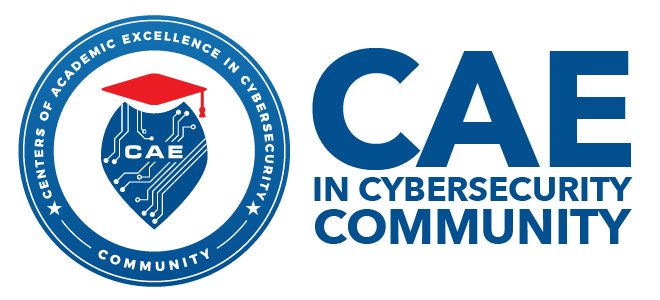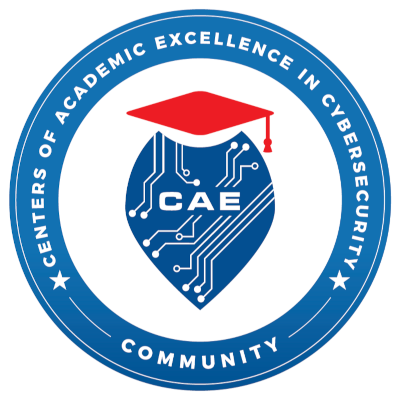The 2024 CAE-R CoP Research Symposium was held at Marriott St. Louis Grand, on Thursday, October 10, 2024, as part of the National Cybersecurity Education Colloquium. The goals of the symposium are to (1) further establish the CAE-R as a community of practice, (2) build a community that involves PhD students, and (3) showcase the excellent research done at CAE-R designated institutions. The symposium will be attended by representatives from CAE-R schools as well as invited government employees.
2024 Program Co-Chairs
Roberto Perdisci, University of Georgia
Gabriela Ciocarlie, University of Texas at San Antonio
2024 Program Committee Members
Elisa Bertino, Purdue University
Guofei Gu, Texas A&M University
Alina Oprea, Northeastern University
Manuel Egele, Boston University
Mark Boutwell, National Security Agency
2024 CAE-R Symposium Program Elements
PhD Candidates Presentations. Initiated in 2023, the CAE-R Symposium continued to provide a unique opportunity to both (a) showcase outstanding PhD students from CAE-R institutions and (b) identify and connect them with potential future faculty hires. A small set of senior PhD students was selected to give a short oral presentation of their research spanning the last few years. Think of this as an opportunity for them to give a preview of their dissertations to a large audience of faculty from CAE-R institutions and representatives from various government agencies. Students were selected based on diversity of research areas and representation of a variety of CAE-R institutions.
Research Highlights Posters. With the goal of fostering awareness and collaboration between CAE-R institutions and showcase the research to government representatives, the program included a Research Highlights Poster Session to feature papers that have been recently published. Most posters were presented by PhD students, but faculty poster presentations were also present. We encourage CAE-R PoCs to nominate up to three research papers in cybersecurity from their institution that have appeared (or will appear) in a 2023 or 2024 cybersecurity research conference.
Research Funding Agency Panel. The program included a panel of program managers from various funding agencies discussing funding opportunities.
Panel with Former Program Managers. The program included a panel where former Program Managers who are now part of academia shared insights on how to prepare a successful funding proposal.
Keynote Presentations. The program included 2 keynote presentations, one from academia and one from the government.
INSuRE+C Research Talks. The program included 4 talks from INSuRE+C funded projects.
2024 CAE-R Symposium Agenda
| Timeslot | Event |
|---|---|
| 8.00 – 8.30am CT | Networking Breakfast |
| 8.30 – 8.40am CT | Welcome Remarks Tony Coulson – CAE Community/Cal State San Bernardino |
| 8.40 – 8.50am CT | Introductory Remarks on the CAE-R Program Dee Dee Patterson – CAE PMO |
| 8.50 – 9.00am CT | Program Committee Co-Chairs' Remarks Roberto Perdisci – University of Georgia Gabriela Ciocarlie – University of Texas at San Antonio |
| 9.00 – 9.45am CT | Government Research Keynote Brad Martin – National Security Agency |
| 9.45 – 10.30am CT | Research Funding Opportunities with Federal Funding Agencies Panel Diba Hadi – Principal Director, DOD CIO Cyber Academic Engagement Office Michael Pozmantier – NSF Karen Karavanic – NSF |
| 10.30 –10.45am CT | Break |
| 10.45 – 11.45am CT | PhD Candidates' Dissertation Overview Presentations Robert Lois – PhD Candidate, University of Pittsburgh Debopriya Dipta – PhD Candidate, Iowa State University Sharmin Aktar – PhD Candidate, University of New Orleans Lorenzo Neil – PhD Candidate, North Carolina State University Clement Fung – PhD Candidate, Carnegie Mellon University Raymond Muller – PhD Candidate, Purdue University |
| 11.45 – 12.00pm CT | INSuRE+C Talk - Using AI to Improve the Development of Security Protocols Martin Duclos – Mississippi State University Ivan Fernandez – Mississippi State University Kaneesha Moore – Mississippi State University |
| 12.00 – 12.15pm CT | INSuRE+C Talk - Post-Quantum Cryptography on Constrained Networks William Joslin – Rochester Institute of Technology Geoff Twardokus – Rochester Institute of Technology |
| 12.15 – 1.45pm CT | Lunch and Research Posters Presentations |
| 1.45 – 2.30pm CT | Academia Research Keynote Cristina Nita-Rotaru – Northeastern University |
| 2.30 – 3.15pm CT | Insights for Successful Funding Proposals from ex-PMs with Faculty Experience Panel Angelos Keromytis – Georgia Tech Sukarno Mertoguno – Georgia Tech Indrajit Ray – Colorado State University |
| 3.15 – 3.30pm CT | Break |
| 3.30 – 3.45pm CT | INSuRE+C Talk - CARdea: Enhancing C-V2X Anomaly Detection within the VEINS Framework Teja Guruvelli – Clemson University |
| 3.45 – 4.00pm CT | INSuRE+C Talk - A Digital Cybersecurity Advisor for the Power Industry Built on Open Source Large Language Foundation Models Rodney Frazier – Rochester Institute of Technology Zachary Lightcap – Rochester Institute of Technology Grace Long Torales – Rochester Institute of Technology |
| 4.00 – 4.15pm CT | Report on Special Topic Workshop Outcomes Kun Sun – George Mason University Rebecca McWhite – National Institute of Standards and Technology William Enck – North Carolina State University |
| 4.15 – 4.30pm CT | CAE-R Discussion and Reflections |
2024 Research Highlights Poster Session
*The poster covers work carried out in the context of the INSuRE program.
**The PhD student has also presented this work during the PhD panels.
| Poster Title | Poster Authors (Presenters in Bold) |
|---|---|
| A Cybersecurity Summer Camp for High School Students Using Autonomous R/C Cars | Myounggyu Won, Luke Rivers Carrington, Douglas Manuel Espinoza, Mohd Hasan Ali, Dipankar Dasgupta (University of Memphis). |
| *A Digital Cybersecurity Advisor for the Power Industry Built on Open-source Large Language Foundation Models | Grace Long Torales, Rodney Frazier, Zachary Lightcap, Nidhi Rastogi (Rochester Institute of Technology). Government Problem Mentor Benjamin Blakely (Argonne National Laboratory). |
| *A Survey of ROV++: We May Need Another Napkin | Nathan Ferrell, Bryan Chan, Henry Schmidt, Arrianna Szymczak, Berk Gulmezoglu (Iowa State University). Government Problem Mentor Neal Ziring (National Security Agency). |
| A Taxonomy of Side-Channels | Tristan Clark, Jeffrey T. McDonald, Todd R. Andel, Brandon Baggett, Tristan Mullins (University of South Alabama). |
| *Ain’t How You Deploy: An Analysis of BGP Security Policies Performance Against Various Attack Scenarios with Differing Deployment Strategies | Seth Barrett, Calvin Idom, German Zavala Villafuerte, Andrew Byers, Berk Gulmezoglu (Iowa State University). Government Problem Mentor Neal Ziring (National Security Agency). |
| *Assessing the Potential Impact of Memory-Safe Languages for System Software Security | Joshua McCoy (University of Arizona), Chia-Hao Yang (University of Texas at Dallas), Nate Schultz (University of Arizona), Ryan Brockinton (University of Texas at Dallas), Bill Hayes (University of Arizona), Brian Ricks (University of Texas at Dallas). Government Problem Mentor Neal Ziring (National Security Agency). |
| Bridging the Protection Gap: Innovative Approaches to Shield Older Adults from AI-Enhanced Scams | LD Herrera, London Van Sickle, Ashley Podhradsky (Dakota State University). |
| *CARdea: Enhancing C-V2X Anomaly Detection within the VEINS Framework | Teja Guruvelli, Mert D. Pesé (Clemson University). Government Problem Mentor Roland Varriale (Argonne National Laboratory). |
| CAV-AD: A Robust Framework for Detection of Anomalous Data and Malicious Sensors in CAV Networks | Md Sazedur Rahman, Mohamed Abdelsamee Elmahallawy, Sanjay Madria, Samuel Frimpong (Missouri University of Science and Technology). |
| Classifying Malware Traffic Using Images and Deep Convolutional Neural Network | Roger Davis, Kaushik Roy, Jingsheng Xu (North Carolina Agricultural and Technical State University). |
| Comparison of LSTM and MLP Trained Under Differential Privacy For Intrusion Detection | Daniel Machooka, Xiaohong Yuan, Kaushik Roy (North Carolina Agricultural and Technical State University), Guenvere Chen (University of Texas, San Antonio). |
| DefWeb: Defending User Privacy against Cache-based Website Fingerprinting Attacks with Intelligent Noise Injection | Seonghun Son, Debopriya Roy Dipta, Berk Gulmezoglu (Iowa State University). |
| **Detecting, Explaining, and Managing Anomalies in Industrial Control Systems | Clement Fung, Eric Zeng, Lujo Bauer (Carnegie Mellon University). |
| Digital Forensics of Additive Manufacturing Systems | Daniel Bradford Miller, Jacob Gatlin (University of South Alabama), William Bradley Glisson (Sam Houston State University), Mark Yampolskiy, Jeffrey Todd McDonald (University of South Alabama). |
| DISC: A Dataset for Information Security Classification | Elijah Bass, Massimiliano Albanese, Marcos Zampieri (George Mason University). |
| **Dynamic Frequency-Based Fingerprinting Attacks against Modern Sandbox Environments | Debopriya Roy Dipta (Iowa State University), Thore Tiemann (University of Luebeck), Berk Gulmezoglu (Iowa State University), Eduard Marin (Telefonica Research), Thomas Eisenbarth (University of Luebeck). |
| **End-to-End Encryption for Cyber-Physical Systems Using Fully Homomorphic Encryption | Robert Lois (University of Pittsburgh). |
| **Enhancing IoT Security: Anomaly Detection using Deep Support Vector Data Description and Contractive Autoencoder | Sharmin Aktar, Abdullah Yasin Nur (University of New Orleans). |
| *Estimating Intrinsic Dimension to Architect Compact Neural Networks | James Bonacci, Peyton Lutchkus, Reese Martin, Rob Pava, Ping Wang (Robert Morris University). Government Problem Mentor Bradford Kline (National Security Agency). |
| From 5G Sniffing to Harvesting Leakages of Privacy-Preserving Messengers | Norbert Ludant (Northeastern University), Pieter Robyns (Hasselt University), Guevara Noubir (Northeastern University). |
| FSPDE: A Full Stack Plausibly Deniable Encryption System for Mobile Devices | Jinghui Liao (Wayne State University), Niusen Chen (Michigan Technological University), Lichen Xia (University of Delaware), Bo Chen (Michigan Technological University), Weisong Shi (University of Delaware). |
| Harnessing AI for Advanced Network Security: From Attacks on Privacy to Defensive Innovations | Nate Mathews (Rochester Institute of Technology), James K. Holland, Nicholas Hopper (University of Minnesota), Matthew Wright (Rochester Institute of Technology). |
| Moderating Illicit Online Image Promotion for Unsafe User-Generated Content Games Using Large Vision-Language Models | Keyan Guo, Ayush Utkarsh, Wenbo Ding, Isabelle Ondracek (University at Buffalo), Ziming Zhao (Northeastern University), Guo Freeman (Clemnson University), Nishant Vishwamitra (University of Texas at San Antonio), Hongxin Hu (University at Buffalo). |
| Overview of Intelligent Inverters and Associated Cybersecurity Issues for Grid-Connected Solar Photovoltaic System | Sai Nikhil Vodapally, Mohd Hasan Ali (University of Memphis). |
| *Quantum-Resistant IKEv2 in Constrained Networks: A Testbed-Driven Approach | Geoff Twardokus, William Joslin, Ben Carini, Hanif Rahbari (Rochester Institute of Technology). Government Problem Mentor William Layton (National Security Agency). |
| SMET: Semantic Mapping of CVE to ATT&CK and Its Application to Cybersecurity | Basel Abdeen (University of Texas at Dallas), Ehab Al-Shaer (Carnegie Mellon University), Anoop Singhal (National Institute of Standards and Technology), Latifur Khan, Kevin Hamlen (University of Texas at Dallas). |
| UntrustIDE: Exploiting Weaknesses in VS Code Extensions | Elizabeth Lin, Igibek Koishybayev, Trevor Dunlap, William Enck, Alexandros Kapravelos (North Carolina State University). |
| *Utilizing Large Language Models to Translate RFC Protocol Specifications to CPSA Definitions | Martin Duclos, Ivan Fernandez, Kaneesha Moore, Sudip Mittal (Mississippi State University). Government Problem Mentor Ed Zieglar (National Security Agency). |
| Unveiling IoT Security in Reality: A Firmware-Centric Journey | Nicolas Nino (University of Georgia), Ruibo Lu, Wei Zhou (Huazhong University of Science), Kyu Hyung Lee (University of Georgia), Ziming Zha (Northeastern University), Le Guan (University of Georgia). |
| **VOGUES: Validation of Object Guise Using Estimated Components | Raymond Muller (Purdue University), Yanmao Man, Ming Li (University of Arizona), Ryan Gerdes (Virginia Tech), Johnathan Petit (Qualcomm), Z. Berkay Celik (Purdue University). |
| **Who Comes Up with this Stuff? Interviewing Authors to Understand How They Produce Security Advice | Lorenzo Neil (North Carolina State University), Harshini Sri Ramulu (The George Washington University), Yasemin Acar (Paderborn University & The George Washington University), Bradley Reaves (North Carolina State University). |
| ZCube: A Zero-Trust, Zero-Knowledge, and Zero-Memory Platform for Privacy and yet Secured Access | Vinh Quach, Ram Dantu, Sirisha Talapuru, Shakila Zaman, Apurba Pokharel (University of North Texas). |
Updated: Mar 10, 2025


